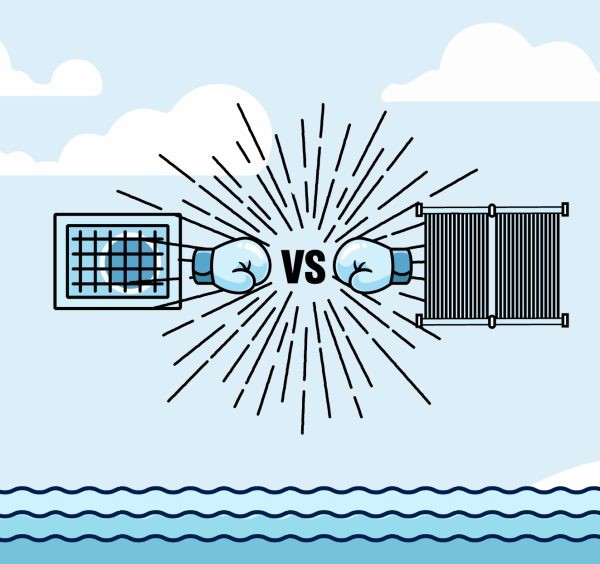Heat Pump versus Solar Pool Heater

Choosing between pool heat pumps and solar pool heaters is not a straightforward decision, and there isn't a one-size-fits-all answer. As the owner of both a solar pool heating company www.solartubs.com and a pool Heat pump www.arcticheatpumps.com company we want to provide you with unbiased information to help you make an informed decision based on your specific needs. Various factors, such as the size of your pool, frequency of use, heating budget, and your location, play a crucial role in determining the most suitable option for you.
In this discussion, we will dive into how each type of pool heater operates and explore the distinct advantages and disadvantages associated with pool heat pumps and solar pool heaters. By understanding the workings of each system, you can make an educated choice that aligns with your preferences and requirements.
Pool Heat Pumps vs Solar Pool Heaters
Pool Heat Pumps
How They Work: Pool heat pumps operate most efficiently in moderately warm environments and are renowned for their energy efficiency. Unlike electric resistance pool heaters that directly generate heat using electricity, pool heat pumps use a different approach. These pumps harness natural heat from the surrounding air. Here's a brief overview of the process:
The pump uses a small amount of energy to spin a fan, pulling warm air from the atmosphere through an evaporator coil.
The evaporator coil contains eco-safe refrigerant, and when combined with warm air, it produces a warm gas.
The gas is compressed in the heater's compressor, generating heat.
The hot gas flows through a heat exchanger, heating water that passes over the tubing.
The warmed water is then circulated back into the pool, and the cycle repeats.
Advantages:
Can operate in various weather conditions even below freezing (Arctic Heat Pump).
Are Eco-safe with no harmful emissions.
Lower monthly operation costs (compared to gas).
Can heat at night.
Certain Pool Heat Pumps can also chill the pool.
Disadvantages:
Less efficient below freezing.
Requires a dedicated electrical connection of 40 amps or more.
Slower heating time compared to electric or gas heaters, especially for larger pools.
Cost significantly more to operate versus solar.
Cost: Typically priced between $3,000 and $5,000, plus installation.
Ideal for: Small to large-sized backyard pools.
Life Expectancy: 10 Years
Solar Pool Heaters
How They Work: Solar pool heaters are popular in sunny states and commonly consist of plastic or glazed panels rooftops. These panels collect solar heat, and the heating process is straightforward:
- The pool pump circulates water through pipes and past filters.
- The water is pumped to the rooftop, where solar-heated collectors transfer the heat directly to the water.
- The warm water flows back into the pool through an outlet pipe.
Advantages:
- Generates free heat if there is some sunlight.
- Most Eco-friendly option with no harmful emissions.
- Low to Zero maintenance
- Relies only on the power of the pool pump (very low operating cost)
Disadvantages:
- Ineffective without sunlight (at nighttime)
- Slowest heating time among pool heater types.
- Higher upfront costs
- Requires lots of roof or ground space.
Cost: Usually priced between $4,000 and $6,500, plus installation.
Ideal for: Small to medium-sized backyard pools.
Life Expectancy: 20-30 Years
Choosing the Right Pool Heater for You
Now that you understand how each type of heater operates, consider the following:
- For frequent swimmers in warm climates: A pool heat pump is a reliable option, providing consistent heat regardless of weather or time of day.
- For seasonal swimmers in sunny locations: A solar pool heater can be a cost-effective choice, utilizing solar power and keeping electricity bills low. However, it's crucial to note that it depends entirely on sunlight and has slower heating times.
- For high-cost power or tiered electrical power: If you have high electricity costs or are on a tiered system solar will be a very attractive offer. Using a heat pump will 100% cause your power usage to go up. If you end up in another cost tier because of the added usage, then you may want to re-evaluate and go with solar.
- Overall Life Operating Cost: In most cases the solar option wins in the overall operating cost factoring in both the purchase price and cost of monthly operations. If you decision is purely financial, and you don’t mind the slightly higher upfront cost then a solar pool heater will general take first place in the financial ROI compared to a heat pump.
- Combine the power of both: Many pool owners opt for a combination of a solar pool heater and a pool heat pump. This hybrid approach allows for solar-powered heating on sunny days, reducing energy costs. On colder or cloudy days, the pool heat pump efficiently takes over, heating the water faster due to the pre-warmed water from the solar heater.
In conclusion, the choice between pool heat pumps and solar pool heaters depends on your specific needs, location, and lifestyle. Each option has its advantages, but the key is to select the heater that aligns best with your circumstances. For some, the combination of a pool heat pump and a solar pool heater provides the optimal solution, offering the benefits of both eco-friendly heating options.








